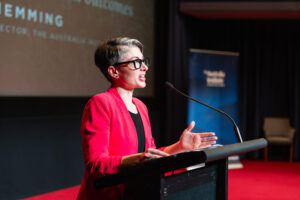The Climate Change Authority has been strengthened after successive Coalition governments stripped it of its potential, but its role and independence remain in doubt
Tony Abbott’s government casts a long shadow over Australia and our current leaders. A carbon tax remains unspeakable, burning native forest is still considered renewable energy and many of the public agencies it ransacked are poor imitations of their former selves.
The Climate Change Authority (CCA) – an independent body mandated to give climate policy advice to government – is among the survivors of Abbott’s regressive agenda. Although the Coalition didn’t have the numbers in the senate to abolish it, it did have the power to malign it and starve it of funding. It was a humiliating regime that continued under successive Coalition leaders.
Former Reserve Bank of Australia governor Bernie Fraser was the chair of the CCA when it got caught in the Coalition’s crosshairs in 2013. During this time, he recalls, “life became increasingly difficult … [then Environment minister Greg Hunt] had oversight of the authority but his only interest in it was to have it abolished”. Fraser resigned from his role as chair in 2015, three years into a five-year appointment as “worsening relations with the minister eventually reached the point that prompted me to move on”.
Why has the Albanese government, with its bold language around integrity and independence, sidestepped the issue of the Coalition incumbents on the CCA board?
While Abbott failed to get rid of the CCA, Scott Morrison succeeded in distorting its role beyond recognition. In 2021 it became one of many diminished public agencies that were adapted or revived by the Morrison government to pursue an agenda of fossil fuel expansion under the guise of climate and economic policy.
Committees, advisory bodies and agencies were staffed with political allies and industry stakeholders, and Grant King – a former president of the Business Council of Australia and former gas company executive – was made chair of the CCA. Critics described King as “uniquely unsuited” to head up an independent climate body and saw his appointment as a “win for fossil fuels”.
However, in November 2022, six months after Australia’s “greenslide” election, the Climate Change Authority is restored to a legislated position of esteem. It has recently announced it will deliver its first official climate advice to the Albanese government, as required by Australia’s landmark Climate Change Act. The advice will inform Minister for Climate Change and Energy Chris Bowen’s first annual climate change statement to parliament on December 1.
The Labor government has made much of the “crucial role” of the CCA. Since the election, it has committed $47.1 million to restoring the authority and added three new members to the board “to bolster its role in providing independent advice to Government on the reduction of the nation’s emissions and climate change policy”.
However, “bolstering” independence should not be confused with actually achieving it. Grant King and other Coalition appointments remain at the CCA’s helm – and will until 2025.
While he is often criticised for his back catalogue of fossil fuel advocacy, King has expanded his repertoire and now appears to have significant interests in all aspects of Australia’s climate policy: environmental markets and investments, carbon farming and renewable energy.
Between 2020 and 2021, King was appointed chair of HSBC Bank Australia; chair of GreenCollar, Australia’s largest carbon offset project developer; and chair of renewable energy company CWP Renewables. All are paid roles. He also runs his own climate and energy consultancy, GK Advisory, and is a director of the Great Barrier Reef Foundation. The potential interaction of these appointments is neatly illustrated by the fact that in 2020 HSBC announced it was the first private investor in Queensland’s water-quality market, which was designed to protect the Great Barrier Reef, and had purchased a number of “reef credits” from the architect and developer of the scheme, GreenCollar.
In response to questions from The Saturday Paper, King said the issue of potential conflicts is one he and his colleagues take seriously, and that “an important foundation for the identification and management of conflicts is timely and full disclosure of members’ interests to the authority”. He says he’s confident the processes the authority has in place to manage potential conflicts “represent a robust approach”. King also noted that the authority ’s analysis and recommendations are published, so “people are free to assess and form their own view on the merits of our work”. Mr King confirmed his appointments but did not comment on any investments he may have.
Documents from the Australian Securities and Investments Commission (ASIC) reveal that King owns shares in GreenCollar’s holding company, Green Climate Co. In turn, this holding company has some ownership and links to Australia’s second- and third-biggest carbon offset developers, AgriProve and Corporate Carbon.
Carbon offsets are central to Australia’s climate policy. The government has said that “carbon credits will play a vital role in our government’s climate action plan” but that more had to be done to “unlock the full potential of the carbon credit system”. Similarly, the government says by 2030 82 per cent of Australia’s power needs will be supplied by renewable energy, foreshadowing a huge increase in the country’s related infrastructure.
The Saturday Paper is not suggesting any impropriety on the part of Grant King – or, indeed, any other former or current member of the CCA board. However, even where potential conflicts are disclosed and managed on a case-by-case basis, the CCA’s entire mandate is to provide climate advice that will directly affect the supply and demand of carbon offsets and renewable energy in Australia.
King may just be a savvy investor, getting ahead of the game with a view to enjoying the returns on Australia’s new-found climate ambition. Still, the risk is that his decisions, or the decisions by the businesses he chairs, could be seen to be influenced by his government appointments. It is also unclear whether appointments to the CCA can be seen to be independent if they have any control over policy levers from which they could potentially benefit.
Which raises another question: Why has the Albanese government, with its bold language around integrity and independence, sidestepped the issue of the Coalition incumbents on the CCA board? Indeed, the government’s announcement that it was “bolstering” the CCA’s independence appears to be an admission that independence was lacking to begin with.
King is not the only member of the CCA board to have commercial interests that may conflict with their duties. Other members, including Susie Smith – former Santos executive and chief executive of the Australian Industry Greenhouse Network, a fossil fuel lobby group with a notorious reputation for climate obstruction – have potential interests in fossil fuels, carbon credits and climate change investments. According to the CCA legislation, all should have advised the government of “interests, pecuniary or otherwise” that could conflict with their roles.
Former Greens leader, and one of the original architects of the CCA, Christine Milne, is sceptical that Labor is serious about the integrity of the CCA and climate action in general. “Chris Bowen wants optics, not outcomes,” she tells The Saturday Paper. “I welcome the new appointments to the CCA but his decision to keep Grant King as chair and Susie Smith on the board … ensures that the advice he gets from CCA will be a front for business as usual – gas, CCS [carbon capture and storage] and offsets.”
The CCA has noble origins. According to Milne, it was set up to research bestpractice climate policy – including what Australia’s fair share might be – and recommend robust targets for Australia’s emissions trading scheme. While the scheme the CCA was specifically established to advise on has been abolished, it still has a worthy-sounding mandate. Corporate documents say the organisation “seeks to embody” independence, transparency, good governance and accountability.
Even while battling the Coalition’s contempt, Bernie Fraser was proud of the CCA’s work and remains loyal to the organisation, saying that “despite ministerial disinterest and general disparagement, the expert and independent authority conscientiously produced numerous reports on a host of climate issues which were widely welcomed”.
Political newcomers agree that the CCA should not be a vehicle for political interests. The independent senator David Pocock says, “Australians now rely more than ever on the Climate Change Authority to provide independent advice that is informed by climate science.” In negotiating the government’s Climate Change Bill, he pushed – unsuccessfully – to include a requirement that would have obliged the CCA to explain its regard, or lack thereof, for scientific evidence when delivering its advice to government.
It is not surprising that this amendment was rejected, given that the Labor government’s commitment to fossil fuel expansion is entirely at odds with the scientific consensus on what needs to happen to keep the world within the bounds of catastrophic warming. But the government should be wary of ignoring concerns around the veracity of its climate policies and rhetoric, given how many independent candidates were elected to parliament based on their explicit commitments to integrity measures and to climate policy.
“People are frustrated with the partisan nature of climate politics,” Pocock tells The Saturday Paper. “They want decisions to be informed by experts and delivered with transparency and accountability. We need to reduce the power of vested interests and focus on what best serves the community.”
“Bolstering” the independence of the Coalition’s legacy is as likely to alleviate these frustrations as a claim of “slightly better” transparency or “improved” accountability would. Regardless of advice the CCA delivers to the government this month and in the future, the credibility of Australia’s key climate body will remain in doubt until it has achieved full independence and is entirely free from industry influence.
Between the Lines Newsletter
The biggest stories and the best analysis from the team at the Australia Institute, delivered to your inbox every fortnight.
You might also like
We need political courage, not caution | Polly Hemming
When it comes to solving the biggest national problems, a bit of courage leaves political caution for dead. Now’s not the time for politeness.
Integrity at home shapes global outcomes – Polly Hemming | Climate Integrity Summit 2025
Despite frequent claims that Australia is ‘too small to make a difference,’ historical evidence demonstrates our nation’s outsized role in influencing international norms and policies.
Now is the time for brave reform
A housing crisis, accelerating climate change and widening inequality all confront the re-elected Albanese Government, but the solutions exist (and often aren’t that complicated).



